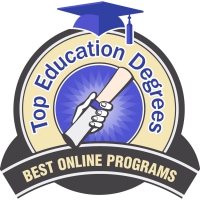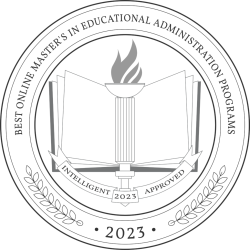Master of Education
Make an Impact
Benefits to earning a
Master’s Degree in Education:
Improve your teaching skills
Keep up on advances in education
Focus on
a specialty
Stand out from your peers
Take on a
leadership role
Increase your earning potential
What’s the Difference at DWU?
-
100% online
Complete your coursework anywhere, anytime. -
7-week courses
Courses are accelerated, so you only focus on the skills that are relevant to teaching today. -
Start class now.
After you are accepted, you can start taking classes within seven weeks. This means you can start when it’s convenient for you. -
15 months
If you attend full-time, you can complete the program in under two years. If you need a slower pace, you can take classes part-time. -
Designed by teachers for teachers
Our M.Ed. program is designed specifically for current teachers looking to increase knowledge, skill and ability. With experienced faculty and relevant courses, you will succeed. -
Auto Acceptance
Auto acceptance for DWU graduates with at least a 3.0 undergraduate GPA.
Pick Your Path
What does your future hold? Do you want to pursue teaching at the college level or college administration? Are you seeking an administrative position in a PreK-12 education system? Do you want to become an athletic director? Do you wish to inspire English learners? Or maybe you just want to update your skills to inspire today's learners. Whichever way, DWU has the path for you.
Options:
- Advanced Teacher Pathway
- Athletic and Activities Administration
- Educational Policy and Administration
- English as a New Language
- K-12 Principal
Further your teaching career with practical and relevant courses.
Master of Education - Advanced Teacher Pathway
Become a master of your classroom! The Advanced Teacher Pathway offers flexible, stackable options to strengthen your classroom approach and leadership skills. Design a personalized degree by combining core classes, one or more graduate certificates, and additional electives. This degree requires 36 credit hours.
Behavior Management (12 credits)
EDU 620 Behavior Management Principles
EDU 633 Inclusive Classroom Culture
EDU 654 Fostering Resilient Learning Through Trauma-Informed Teaching
EDU 668 Behavior Strategies and Supporting Behavior
Educational Policy (12 credits)
EDU 651 Education in a Culture of Change
EDU 655 Public Policy in Education
EDU 657 Education Finance and Funding
EDU 687 Legal and Ethical Issues in Education
English As a New Language (18 credits)
ENL 662 Foundations in English as a New Language
ENL 663 Literacy for Multilingual Learners
ENL 664 Methods for Teaching English as a New Language
ENL 665 Culture and Linguistics
ENL 668 Assessment of ENL Students and Programs
ENL 671 Language in Learning Across the Curriculum
Research & Analysis in Education (9 credits)
EDU 603 Statistical Analysis in Education
EDU 683 Assessment, Planning, and Evaluation
EDU 690 Research Methodologies
Athletic and Activities Administration (18 credits)
BUS 606 Adaptive Leadership and Change Management
BUS 617 Employee Life Cycle
BUS 627 Event and Facilities Planning and Management
BUS 628 Advanced Public Relations and Promotion
BUS 629 Revenue Generation and Management
BUS 636 Conflict Management
Differentiation for All Learners (15 credits)
EDU 611 Differentiation in Practice
EDU 614 Understanding to Support the Neurodivergent Child
EDU 616 Fostering Belonging in Diverse Classrooms
EDU 618 Strategies for Talented and Gifted Education
ENL 658 Supporting English Learners in the Classroom
Teacher Leadership (12 credits)
EDU 615 School Improvement
EDU 672 Introduction to Teacher Leadership
EDU 674 Advocacy and Agency in Education
EDU 677 Instructional Supervision
Master of Education - Athletic and Activities Administration
The AAA certification will offer you practical and relevant skills needed to excel in workplaces with specialized leadership and management opportunities. You will learn and apply skills for developing and managing high functioning teams, planning events, managing facilities, raising funds, working with their public, using contemporary skills for promotion and more. The program requires 36 coursework credit hours, including a practicum.
Courses
BUS 606 Adaptive Leadership and Change Management
BUS 617 Employee Life Cycle
BUS 627 Event and Facilities Planning and Management
BUS 628 Advanced Public Relations and Promotion
BUS 629 Revenue Generation and Management
BUS 636 Conflict Management
EDU 613 School and Community Relations
EDU 620 Behavior Management Principles
EDU 661 Advanced Educational Psychology
EDU 683 Assessment, Planning, and Evaluation
EDU 685 Teaching and Learning
EDU 687 Legal and Ethical Issues in Education
EDU 691 Educational Policy and Administration Practicum or Thesis
ENL 658 Supporting English Learners in the Classroom
Master of Education - Educational Policy and Administration
This program is designed for students with a bachelor’s degree who are interested in PreK-12 post-secondary education career paths. The program requires 36 coursework credit hours and a capstone. For your capstone experience, you may choose to write a research thesis or take a comprehensive examination.
Courses
EDU 603 Statistical Analysis in Education
EDU 610 Human Relations: Multiculturalism
EDU 620 Behavior Management Principles
EDU 655 Public Policy in Education
EDU 659 Educational Leadership
EDU 661 Advanced Educational Psychology
EDU 675 Education Law
EDU 683 Assessment, Planning, and Evaluation
EDU 685 Teaching and Learning
EDU 687 Legal and Ethical Issues in Education
EDU 690 Research Methodologies
EDU 691 Educational Policy and Administration Practicum or Thesis
ENL 658 Supporting English Learners in the Classroom
SPD 601 The All-Inclusive Classroom
Master of Education - English as a New Language (ENL)
English as a new language education endorsement requires coursework that studies linguistics, development of curriculum and instruction for new language acquisition, language and culture, program assessment, reading for students with limited English proficiency, and English as a new language methodology course. The program requires 37-40 coursework credit hours and the completion of a comprehensive exam.
Courses
EDU 613 School and Community Relations
EDU 620 Behavior Management Principles
EDU 675 Education Law
EDU 677 Instructional Supervision
EDU 691 Educational Policy and Administration Practicum or Thesis
ENL 651 Practicum for the Elementary Teacher or Practicum for the Mid and High School Teacher
ENL 658 Supporting English Learners in the Classroom
ENL 662 Foundations in English as a New Language
ENL 663 Literacy for Multilingual Learners
ENL 664 Methods for Teaching English as a New Language
ENL 665 Culture and Linguistics
ENL 667 Applied Linguistics
ENL 668 Assessment of ENL Students and Programs
ENL 669 Curriculum, Programs, and Policies for ENL
ENL 670 Seminar in Special Topics
You may also pursue an ENL Endorsement without a master’s degree. Talk to your admissions representative about this option.
Master of Education - K-12 Principal
This program is designed for students with a bachelor’s degree in either elementary or secondary education and three years teaching experience who are interested in educational leadership in PreK-12 schools. The program requires 36 coursework credit hours, including an internship, and the completion of a comprehensive exam.
Courses
BUS 617 Employee Life Cycle
EDU 603 Statistical Analysis in Education
EDU 610 Human Relations: Multiculturalism
EDU 613 School and Community Relations
EDU 615 School Improvement
EDU 620 Behavior Management Principles
EDU 659 Educational Leadership
EDU 665 Curriculum & Teaching Methods
EDU 673 Educational Administration
EDU 675 Education Law
EDU 677 Instructional Supervision
EDU 690 Research Methodologies
EDU 693 Internship
ENL 658 Supporting English Learners in the Classroom
Accreditation and Rankings
The DWU Master of Arts in Education is accredited by the Higher Learning Commission of the North Central Accreditation Association and is affirmed by the South Dakota Department of Education and NC-SARA.
We are honored.
Best Online Master’s in Education Programs
U.S. News and World Report

Best Online College in South Dakota
OnlineU

Top 50 Best Master’s in Educational Leadership Online
Top Education Degrees

Best Online Master’s in Educational Administration
Intelligent.com
Admission Requirements
To be eligible for admission, you must meet the following criteria:
- A bachelor’s degree from an accredited institution
- Minimum undergraduate cumulative grade point average (GPA) of 2.7.
After you have completed the online application, we will contact you to explain how to complete the submission process. You will be asked to provide:
- An official transcript from your bachelor’s degree-awarding institution
- A personal résumé
-
A personal statement of 300 to 500 words answering the following questions:
Why do I want to pursue a M.Ed. from Dakota Wesleyan University?
How do I plan to use what I learn to improve education for our next generation of students?
Complete the FREE online application now!
Paying For Your Degree
Earning a degree is a great personal investment. There are a few common paths some of our students take to finance their online education at Dakota Wesleyan University.
Your Contacts
As you explore the M.Ed. program, you will work with an admissions representative and our program coordinator.

















